What is happening in Albania?
Activities
A training was held with representatives of the Local Security Council in Vlora Municipality, within the project funded by GCERF on “Management of the process of rehabilitation and re-integration of Albanian citizens returned from the Syria-Iraq conflict areas”. 16 (sixteen) participants, representatives of the Vlora Local Security Council, participated in the training conducted by the experts provided by the Counseling Line for Women and Girls.
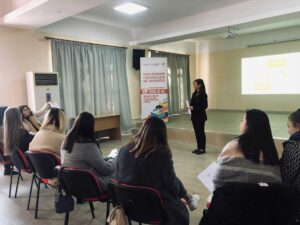
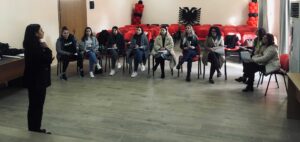
A training was held with representatives of the Local Security Council in Shkodra Municipality, within the project funded by GCERF on “Management of the process of rehabilitation and re-integration of Albanian citizens returned from the Syria-Iraq conflict areas”. 15 (fifteen) participants, representatives of the Shkodra Local Security Council, participated in the training conducted by the experts provided by the Counseling Line for Women and Girls.
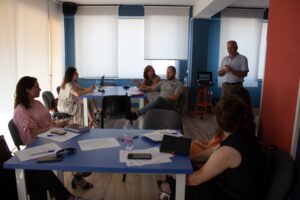
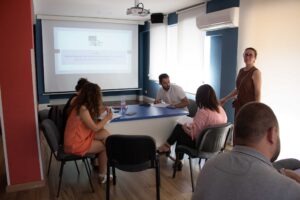
Workshop held in Shkodër with Youth within the project financed by GCERF, on “Management of the process of rehabilitation and re-integration of Albanian nationals returned from the areas of the Syria-Iraq conflict” for the information and awareness on countering violent extremism and religious radicalism as well as for the rehabilitation and re-integration of returnees from conflict areas in Syria and Iraq. Participants in this workshop were 23 (twenty-three) young people from the community who also got introduced to the services offered by the Counseling Line for Women and Girls as well as the telephone line dedicated to the fight against violent extremism.
Workshop held in Elbasan with Women within the project financed by GCERF, on “Management of the process of rehabilitation and re-integration of Albanian nationals returned from the areas of the Syria-Iraq conflict” for the information and awareness on countering violent extremism and religious radicalism as well as for the rehabilitation and re-integration of returnees from the conflict zones in Syria and Iraq. Participants in this workshop were 22 (twenty-two) women from the community who also got introduced to the services offered by the Counseling Line for Women and Girls as well as the telephone line dedicated to the fight against violent extremism.
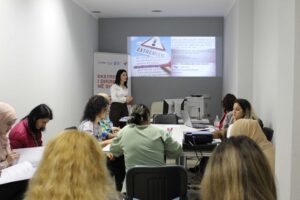
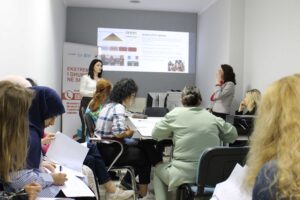
Workshop held in Librazhd with Women within the project financed by GCERF, on “Management of the process of rehabilitation and re-integration of Albanian nationals returned from the areas of the Syria-Iraq conflict” for the information and awareness on countering violent extremism and religious radicalism as well as for the rehabilitation and re-integration of returnees from the conflict zones in Syria and Iraq. Participants in this workshop were 23 (twenty-three) women from the community who also got introduced to the services offered by the Counseling Line for Women and Girls as well as the telephone line dedicated to the fight against violent extremism.
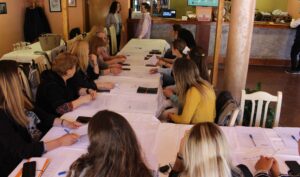
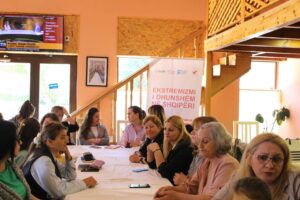
Workshop held in Tirana with Women within the project financed by GCERF, on “Management of the process of rehabilitation and re-integration of Albanian nationals returned from the areas of the Syria-Iraq conflict” for the information and awareness on countering violent extremism and religious radicalism as well as for the rehabilitation and re-integration of returnees from the conflict zones in Syria and Iraq. Participants in this workshop were 21 (twenty-one) women from the community who also got introduced to the services offered by the Counseling Line for Women and Girls as well as the telephone line dedicated to the fight against violent extremism.
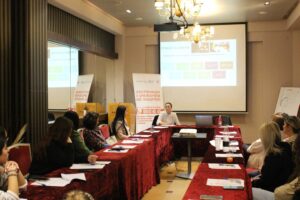
Workshop held in Tirana with Youth within the project financed by GCERF, on “Management of the process of rehabilitation and re-integration of Albanian nationals returned from the areas of the Syria-Iraq conflict” for the information and awareness on countering violent extremism and religious radicalism as well as for the rehabilitation and re-integration of returnees from conflict areas in Syria and Iraq. Participants in this workshop were 21 (twenty-one) young people from the community who also got introduced to the services offered by the Counseling Line for Women and Girls as well as the telephone line dedicated to the fight against violent extremism.
A training was held for the teachers and support teachers for returned children within the project financed by GCERF, on “Management of the rehabilitation and re-integration process of Albanian children returned from the Syria-Iraq conflict areas”. 12 (twelve) participants, teachers at the “Drita Pelinku” school, Tirana, took part in the training conducted by the experts provided by the Counseling Line for Women and Girls.
Workshop held in Bulqiza with Women within the project financed by GCERF, on “Management of the process of rehabilitation and re-integration of Albanian nationals returned from the areas of the Syria-Iraq conflict” for the information and awareness on countering violent extremism and religious radicalism as well as for the rehabilitation and re-integration of returnees from the conflict zones in Syria and Iraq. Participants in this workshop were 20 (twenty) women from the community who also got introduced to the services offered by the Counseling Line for Women and Girls as well as the telephone line dedicated to the fight against violent extremism.
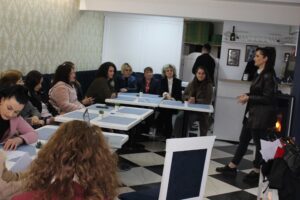

A training was held for the teachers and support teachers for returned children within the project financed by GCERF, on “Management of the rehabilitation and re-integration process of Albanian children returned from the Syria-Iraq conflict areas”. 20 (twenty) participants, teachers at the “1 Qershori” school, Tirana, took part in the training conducted by the experts provided by the Counseling Line for Women and Girls.
Workshop held in Elbasan with Youth within the project financed by GCERF, on “Management of the process of rehabilitation and re-integration of Albanian nationals returned from the areas of the Syria-Iraq conflict” for the information and awareness on countering violent extremism and religious radicalism as well as for the rehabilitation and re-integration of returnees from conflict areas in Syria and Iraq. Participants in this workshop were 27 (twenty-seven) young people from the community who also got introduced to the services offered by the Counseling Line for Women and Girls as well as the telephone line dedicated to the fight against violent extremism.
A training was held for the teachers and support teachers for returned children within the project financed by GCERF, on “Management of the rehabilitation and re-integration process of Albanian children returned from the Syria-Iraq conflict areas”. 18 (eighteen) participants, teachers at the “Niket Dardani” school, Tirana, took part in the training conducted by the experts provided by the Counseling Line for Women and Girls.
A training was held for the teachers and support teachers for returned children within the project financed by GCERF, on “Management of the rehabilitation and re-integration process of Albanian children returned from the Syria-Iraq conflict areas”. 11 (eleven) participants, teachers at the “Kasem Shima” school, Tirana, took part in the training conducted by the experts provided by the Counseling Line for Women and Girls.
A training was held with representatives of the Local Security Council in Tirana Municipality, within the project funded by GCERF on “Management of the process of rehabilitation and re-integration of Albanian citizens returned from the Syria-Iraq conflict areas”. 18 (eighteen) participants, representatives of the Tirana Local Security Council, participated in the training conducted by the experts provided by the Counseling Line for Women and Girls.
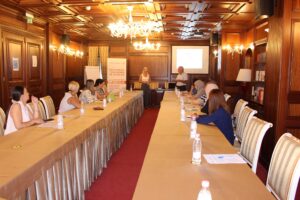
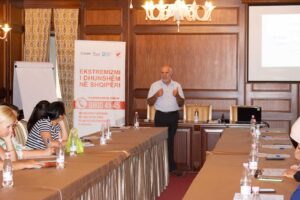
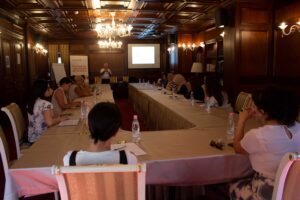
Workshop held in Vlora with Women within the project financed by GCERF, on “Management of the process of rehabilitation and re-integration of Albanian nationals returned from the areas of the Syria-Iraq conflict” for the information and awareness on countering violent extremism and religious radicalism as well as for the rehabilitation and re-integration of returnees from the conflict zones in Syria and Iraq. Participants in this workshop were 21 (twenty-one) women from the community who also got introduced to the services offered by the Counseling Line for Women and Girls as well as the telephone line dedicated to the fight against violent extremism.
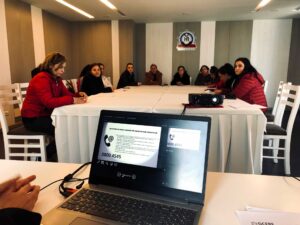
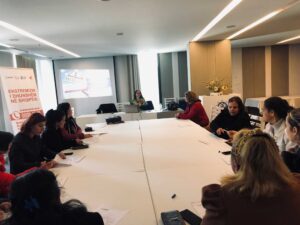
Workshop held in Vlora with Youth within the project financed by GCERF, on “Management of the process of rehabilitation and re-integration of Albanian nationals returned from the areas of the Syria-Iraq conflict” for the information and awareness on countering violent extremism and religious radicalism as well as for the rehabilitation and re-integration of returnees from conflict areas in Syria and Iraq. Participants in this workshop were 17 (seventeen) young people from the community who also got introduced to the services offered by the Counseling Line for Women and Girls as well as the telephone line dedicated to the fight against violent extremism.
A training was held for the teachers and support teachers for returned children within the project financed by GCERF, on “Management of the rehabilitation and re-integration process of Albanian children returned from the Syria-Iraq conflict areas”. 18 (eighteen) participants, teachers at the “Shkolla e Kuqe” school, Tirana, took part in the training conducted by the experts provided by the Counseling Line for Women and Girls.
A training was held for the teachers and support teachers for returned children within the project financed by GCERF, on “Management of the rehabilitation and re-integration process of Albanian children returned from the Syria-Iraq conflict areas”. 10 (ten) participants, teachers at the “Gjergj Fishta” school, Tirana, took part in the training conducted by the experts provided by the Counseling Line for Women and Girls.
Workshop held in Librazhd with Women within the project financed by GCERF, on “Management of the process of rehabilitation and re-integration of Albanian nationals returned from the areas of the Syria-Iraq conflict” for the information and awareness on countering violent extremism and religious radicalism. Participants in this workshop were 22 (twenty-two) women from the community who also got to know the services offered by the Counseling Line for Women and Girls as well as got introduced to the telephone line dedicated to the fight against violent extremism.
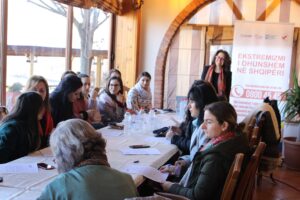
Workshop held in Shkodra with Women within the project financed by GCERF, on “Management of the process of rehabilitation and re-integration of Albanian nationals returned from the areas of the Syria-Iraq conflict” for the information and awareness on countering violent extremism and religious radicalism. Participants in this workshop were 30 (thirty) women from the community who also got to know the services offered by the Counseling Line for Women and Girls as well as got introduced to the telephone line dedicated to the fight against violent extremism.
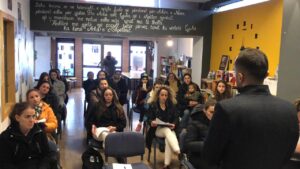
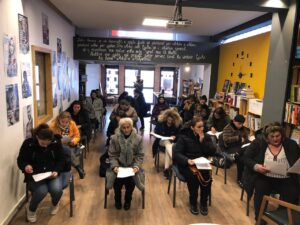
Workshop held in Elbasan with Women within the project financed by GCERF, on “Management of the process of rehabilitation and re-integration of Albanian nationals returned from the areas of the Syria-Iraq conflict” for the information and awareness on countering violent extremism and religious radicalism. Participants in this workshop were 23 (twenty-three) women from the community who also got to know the services offered by the Counseling Line for Women and Girls as well as got introduced to the telephone line dedicated to the fight against violent extremism.
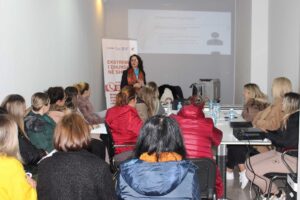
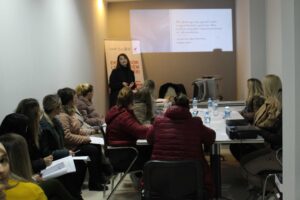
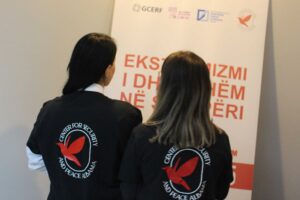
Workshop held in Elbasan with Youth within the project financed by GCERF, on “Management of the process of rehabilitation and re-integration of Albanian nationals returned from the areas of the Syria-Iraq conflict” for the information and awareness on countering violent extremism and religious radicalism. Participants in this workshop were 16 (sixteen) young people from the community who also got to know the services offered by the Counseling Line for Women and Girls as well as got introduced to the telephone line dedicated to the fight against violent extremism.
Workshop held in Librazhd with Youth within the project financed by GCERF, on “Management of the process of rehabilitation and re-integration of Albanian nationals returned from the areas of the Syria-Iraq conflict” for the information and awareness on countering violent extremism and religious radicalism. Participants in this workshop were 27 (twenty-seven) young people from the community who also got to know the services offered by the Counseling Line for Women and Girls as well as got introduced to the telephone line dedicated to the fight against violent extremism.
Workshop held in Vlora with Women within the project financed by GCERF, on “Management of the process of rehabilitation and re-integration of Albanian nationals returned from the areas of the Syria-Iraq conflict” for the information and awareness on countering violent extremism and religious radicalism. Participants in this workshop were 25 (twenty-five) women from the community who also got to know the services offered by the Counseling Line for Women and Girls as well as got introduced to the telephone line dedicated to the fight against violent extremism.
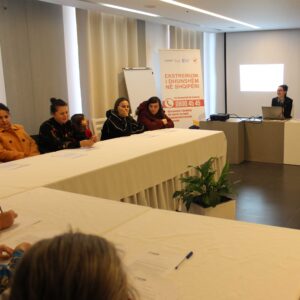
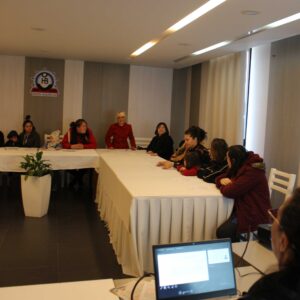
Workshop held in Vlora with Youth within the project financed by GCERF, on “Management of the process of rehabilitation and re-integration of Albanian nationals returned from the areas of the Syria-Iraq conflict” for the information and awareness on countering violent extremism and religious radicalism. Participants in this workshop were 25 (twenty-five) young people from the community who also got to know the services offered by the Counseling Line for Women and Girls as well as got introduced to the telephone line dedicated to the fight against violent extremism.
Workshop held in Shkodra with Youth within the project financed by GCERF, on “Management of the process of rehabilitation and re-integration of Albanian nationals returned from the areas of the Syria-Iraq conflict” for the information and awareness on countering violent extremism and religious radicalism. Participants in this workshop were 30 (thirty) young people from the community who also got to know the services offered by the Counseling Line for Women and Girls as well as got introduced to the telephone line dedicated to the fight against violent extremism.
Workshop held in Pogradec with Youth within the project financed by GCERF, on “Management of the process of rehabilitation and re-integration of Albanian nationals returned from the areas of the Syria-Iraq conflict” for the information and awareness on countering violent extremism and religious radicalism. Participants in this workshop were 17 (seventeen) young people from the community who also got to know the services offered by the Counseling Line for Women and Girls as well as got introduced to the telephone line dedicated to the fight against violent extremism.
Workshop held in Bulqiza with Youth within the project financed by GCERF, on “Management of the process of rehabilitation and re-integration of Albanian nationals returned from the areas of the Syria-Iraq conflict” for the information and awareness on countering violent extremism and religious radicalism. Participants in this workshop were 20 (twenty) young people from the community who also got to know the services offered by the Counseling Line for Women and Girls as well as got introduced to the telephone line dedicated to the fight against violent extremism.
Workshop held in Tirana with Youth within the project financed by GCERF, on “Management of the process of rehabilitation and re-integration of Albanian nationals returned from the areas of the Syria-Iraq conflict” for the information and awareness on countering violent extremism and religious radicalism. Participants in this workshop were 15 (fifteen) young people from the community who also got to know the services offered by the Counseling Line for Women and Girls as well as got introduced to the telephone line dedicated to the fight against violent extremism.
Workshop held in Tirana with Women within the project financed by GCERF, on “Management of the process of rehabilitation and re-integration of Albanian nationals returned from the areas of the Syria-Iraq conflict” for the information and awareness on countering violent extremism and religious radicalism. Participants in this workshop were 16 (sixteen) women from the community who also got to know the services offered by the Counseling Line for Women and Girls as well as got introduced to the telephone line dedicated to the fight against violent extremism.
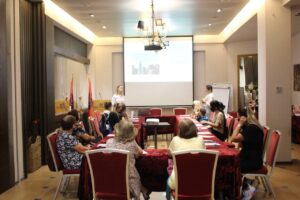
Workshop held in Bulqiza with Women within the project financed by GCERF, on “Management of the process of rehabilitation and re-integration of Albanian nationals returned from the areas of the Syria-Iraq conflict” for the information and awareness on countering violent extremism and religious radicalism. Participants in this workshop were 16 (sixteen) women from the community who also got to know the services offered by the Counseling Line for Women and Girls as well as got introduced to the telephone line dedicated to the fight against violent extremism.
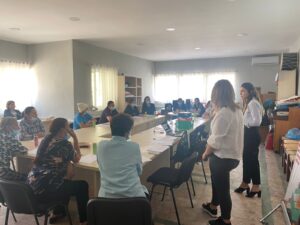

Workshop held in Pogradec with Women within the project financed by GCERF, on “Management of the process of rehabilitation and re-integration of Albanian nationals returned from the areas of the Syria-Iraq conflict” for the information and awareness on countering violent extremism and religious radicalism. Participants in this workshop were 17 (seventeen) women from the community who also got familiar with the services offered by the Counseling Line for Women and Girls as well as got introduced to the telephone line dedicated to the fight against violent extremism.
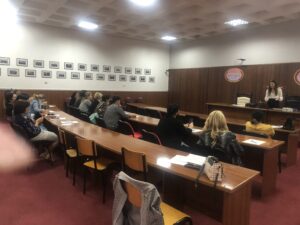
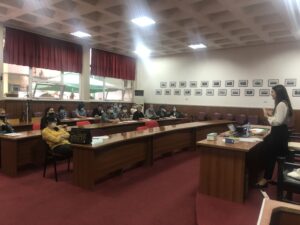
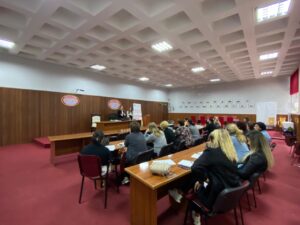
On February 18th 2021, the Center for Security and Peace Albania launched the National Helpline on Violent Extremism 08004545 in order to help people that feel unclear, uninformed or endangered by violent extremism. With the support from US Embassy and Hedayah, program funded from the European Union.
We are now able to provide counselling services to people at risk of becoming part of radical groups as well as providing support to their relatives, by preventing and reintegrating cases that pose a risk of being included in extremist groups. With trust and support from the Coordination Center for CVE and Interior Ministry we signed the agreement of collaboration, in the presence of more than 100 friends and colleagues that followed the event online.
Mr. Brian Beckmann, U.S. Embassy Tirana’s Acting Deputy Chief of Mission and Public Affairs Officer
I am so glad to see several partners gathered here in support of our shared fight against violent extremism, because this is exactly that, a shared effort. Our participation today shows that we stand together, we support one another, all to strengthen our collective goal of preventing and countering violent extremism. In 2019, the State Department, through U.S. Embassy Tirana, supported the establishment of the first ever National CVE Info Call Center. This Center will now provide counseling, information, and support to individuals and communities at risk of radicalization and violent extremism. It will provide a safe space where people’s key support networks, including family, friends and acquaintances, can find information and advice on the role they can play in helping someone avoid participation in violent extremism.
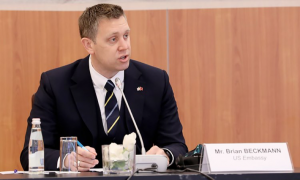
Ms. Romina Kuko, Deputy Minister of the Interior
We signed the agreement of collaboration between the Ministry of the Interior, The Counselling Line for Women and Girls and the CVE Center, for the proper operation of the National Info-call Center which is supported by the US Embassy and Hedayah, program funded by the European Union.
I am proud of this extremely important joint achievement which is an added opportunity in preventing and combating religious radicalization and violent extremism in Albania. The Ministry of the Interior will continue to work towards strengthening local public safety councils so they can start interacting with the community as well as being a strong supporter of any social service referred from the National Info-call Center that we launch today.
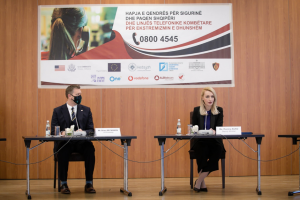
Mr. Alexis Hupin, Head of Political Section, EU Delegation
The center will be critical in preventing radicalisation and violent extremism, while strengthening community resilience in Albania. It offers counselling and support in a safe and protected manner, and is accessible through a simple phone call.
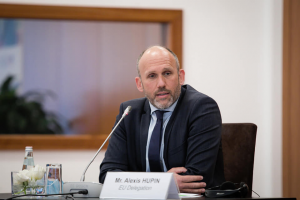
Ms. Lejdi Dervishi, Director of Coordination Center for Countering Violent Extremism in Albania
It is always more profitable to invest our energies, resources & political will in prevention & awareness raising than in rehabilitation and reintegration programs, which always will bear a higher cost for our institutions and communities”. Ms. Dervishi extended her appreciation to the Counseling Line for Women and Girls, Ministry of Interior as well as our international partners, the US Embassy in Tirana and EU in Albania for their continuous collaboration & support in our joint fight to countering radicalism & violent extremism in Albania.
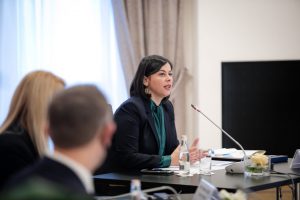
Mr. Ivo Veenkamp, Deputy Executive Director of Hedayah
I think this launch meeting represents the very important milestone for the tremendous work that basically started with our involvement at the end of 2018, when Hedayah received a concept note in one of our call for proposal launched under the EU STRIVE Global program. Regarding the National Info-call center, we would like to mention that this initiative, as far as we know, is a globally unique initiative, and of course initial support alone is not enough.
So I think today actually we have seen the little plant that has grown from the small seeds that CLWG invited us to help grow. It is in a very good position to actually start doing the good work that it can do for those who really need it. But since this initial support, of course, alone is not enough, we also really hope that everybody, all institutions represented here today, and all the other stakeholders, will continue to be active supporters of this call center. And also they [institutions] will continue to benefit from this initiative that as far as we are concerned is not only unique, but also of great potential to really make a difference in reducing the threats and helping people wo are in need of guidance and support. As was mentioned earlier today, as part of much more comprehensive effort and program that is needed to really address all the root causes and drivers of radicalization also in your country. So finally, we would really like to thank the team of CLWG for their excellent efforts to make this project a real success and we hope that we are able to continue to collaborate together with you, and if possible and needed, also in support of the excellent work done by the government of Albania in countering and preventing violent extremism.
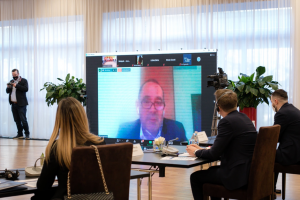
Ms. Iris Luarasi, Executive Director of the Center for Security and Peace Albania.
We operate our national helpline on domestic violence through partnerships with Ministry of Health and Social Protection and all private telecommunication companies in Albania. This successful model helped us on designing another National Helpline against radicalization and extremism. For that we asked for collaboration of the Coordination Center for CVE, Interior Ministry and of course the partnership of private companies in telecommunication. With daily operations of National Helpline for Violent Extremism we will be there to help individuals improve their sense of belonging.
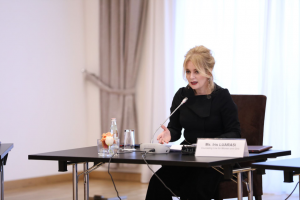
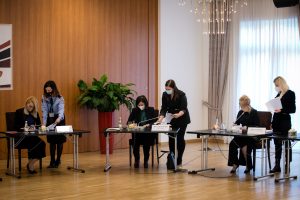
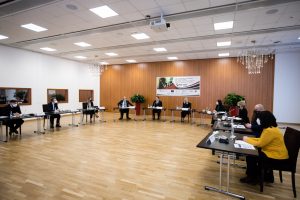
Online training with the youth of the city of Pogradec “Civic engagement and the countering violent extremism and religious radicalization”.
During this training was discussed civic engagement (especially young people) in Pogradec, and were clarified in a simple way the main concepts of radicalism and violent extremism, as well as influencing factors.
The training was organized in an interactive way where the young people themselves discussed strategies and effective ways in preventing radicalism, and inclusion in the community.

Two-day training held in the city of Bulqiza on “Improving the inter-institutional cooperation of the Local Security Council in the framework of prevention and countering violent extremism and religious radicalization.”

Two-day training held in the city of Pogradec on “Improving the inter-institutional cooperation of the Local Security Council in the framework of prevention and countering violent extremism and religious radicalization.”

Two-day training held in the Devoll Municipality on “Improving the inter-institutional cooperation of the Local Security Council in the framework of prevention and countering violent extremism and religious radicalization.

Two-day training held in the city of Librazhd on “Improving the inter-institutional cooperation of the Local Security Council in the framework of prevention and countering violent extremism and religious radicalization.”

The Project Counseling Line for Women and Girls was renamed the Center for Security and Peace Albania
Center for Security and Peace Albania organizes informative meetings with religious believers in rural areas in the city of Elbasan. The meetings emphasized the importance of the role of religious women in preventing and identifying religious radicalization and violent extremism in their communities. The participants, together with the facilitators of the Center, also discussed the social and economic difficulties that believers face in Albania and the opportunities that Albania offers for the positive development of communities.

The training module for capacity building of social and health service workers on the prevention and identification of violent extremism and religious radicalization in their communities is published.
Meetings are held with women in the city of Elbasan, discussing their role as key and decision-makers in communities to ensure sustainability and harmony as well as to prevent violent radicalization and extrem
Qendra për Siguri dhe Paqe Shqipëri organizon takime informuese me besimtare fetare të zonave rurale në qytetin e Elbasanit. Takimet vendosën theksin në rëndësinë e rolit të grave besimtare në parandalimind he identifikimin e radikalizimit fetar dhe ekstremizmit të dhunshëm në komunitetet e tyre. Pjesëmarrësit së bashku me lehtësuesit e Qendrës, diskutuan gjithashtu për vështirësitë sociale dhe ekonomike që besimtarët hasin në Shqipqri dhe për mundësitë që Shqipëria ofron për zhvillimin pozitiv të komuniteteve.
Violent extremism is considered any violent extremist or terrorist activity, which directly or indirectly violates the safety of people on the basis of a specific cause, according to them righteous or holy. The cause can be of political, religious, sports-cultural, ethnic or economic character. Violent extremism is a concept that has a widespread phenomenon all over the world. As violent extremism poses a threat to international security, legal measures have been taken in Albania, through amendments to the Criminal Code of the Republic of Albania, with the ratification of the European Convention for the Prevention of Terrorism and the adoption of Law No. 157 “On measures against terrorist financing” October 2013 by the Albanian Parliament to successfully prevent the spread of violent extremism, including further empowerment of young people, families, women and vulnerable groups. The National Security Strategy reflects the development of state policies on security by defining terrorism as a truly transnational threat to the security of the Republic of Albania. While the National Strategy against Violent Extremism addresses the phenomenon of the approach for prevention of push and pull factors and strengthens the performance of specific acts such as violent acts in strategic communications access and distribution of extremist propaganda via Internet, as well as re-integration of citizens who have joined these groups. Over the past few years radicalism and extremism has become an essential element in studies, reports, media or law enforcement bodies. Various policies have been developed to pursue this issue, which counter violent extremism.
Important dates
Legislation
The Albanian government year by year has been focused on legal improvements to prevent and counter violent extremism. Listed below are the laws that have undergone changes, the new laws drafted for this purpose and the international conventions ratified by Albania:
Law no. 7895, dated 27.01.1995
“Criminal Code of the Republic of Albania”
Law no. 7905, dated 21.03.1995
“Criminal Procedure Code of the Republic of Albania”
Law no. 9918, dated 19.05.2008
"On electronic communications in the Republic of Albania", amended by Law no. 102/2012;
Law no. 9887, dated 10.03.2010
“For the protection of personal data ”, amended, according to Law no. 48/2012 and Law no. 120/2014;
Law no. 10325, dated 23.09.2010
“On State Databases”
Law no. 72, dated 28.06.2012
“For the Organization and Functioning of the National Geospatial Information Infrastructure in the Republic of Albania”
Law no. 72, dated 28.06.2012
“On Cyber-security”
frequently asked questions
FAQ
Terrorism-related terms, including violent extremism and radicalization, are complex and controversial because of the political implications they carry. Former United Nations Secretary-General Ban Ki-moon highlights this difficulty in the Action Plan for the Prevention of Violent Extremism (2015), which states that violent extremism (like terrorism) is a “diverse phenomenon, without a clear definition ”. A newly defined definition of terrorism by the European Parliament and Council on Counter-Terrorism Directive states that terrorism is:
attacks against a person’s life, as intentional acts that can qualify as terrorist offences when and insofar as committed with a specific terrorist aim, namely to seriously intimidate a population, to unduly compel a government or an international organisation to perform or abstain from performing any act, or to seriously destabilise or destroy the fundamental political, constitutional, economic or social structures of a country or an international organisation.
Extremism is broadly defined as “activities (beliefs, behaviors, feelings, actions, strategies) of a character far from being normal. Although this is a very relative term, it is widely accepted that not every extremist view is necessarily illegal and does not automatically lead to violence. In fact, those individuals who have extremist views or even practices, which have no impact on the civil liberties of other citizens, are protected by fundamental human rights.
Extremism starts to become a concern when these views threaten the democratic principles of the rule of law and certain groups promote the use of violence to achieve to achieve their goals or to motivate their followers. This form of extremism is what we call “violent extremism.”
Like terrorism and violent extremism, radicalization is a controversial term with many different definitions. However, a widely accepted definition says that radicalization is the social and psychological process of increasing engagement with ideologies of violent extremism. This usually occurs in non-linear and fluid ways. Persons affected by radicalization will not necessarily become violent. Often, radicalization describes the process by which an individual’s beliefs are oriented toward seeking a drastic change in society. This is not the same as terrorism, but nevertheless, when one believes that fear, terror and violence are justifiable to achieve an ideological, political or social change goal, radicalization turns into violent extremism.
There is no universally accepted definition of the term “violent extremism”. In fact, although in a somewhat confusing way, the terms can sometimes be used interchangeably. However, there are a number of definitions that have been developed nationally, regionally and internationally. One aspect that states and commentators have often simplified is the notion of “radicalization” – a concept that has attracted much attention (and various controversies) – which includes some aspects related to the discourse and efforts to prevent terrorism. The UNHCHR report notes that: The notion of “radicalism” is generally used [by some states] to convey the idea of a process by which an individual embraces a range of increasingly extremist beliefs and aspirations.
Some experts have suggested that “radicalization” can be understood as the process by which individuals embrace violent extremist ideologies that may push them to commit terrorist acts or that may make them more vulnerable to recruitment by terrorist organizations ( Romaniuk, 2015, p. 7-8).
The spread of violent extremism is a very concerning topic for the international community. For example, about 30,000 foreign terrorist fighters, coming from 100 countries, have chosen to go to destinations such as Syria, Iraq, Afghanistan, Libya and Yemen to join terrorist groups engaged in the conflicts of these countries. At some point, a significant number of these fighters return to their countries of origin or go to other areas of potential conflict – bringing with them both the tactical knowledge and ideological views they have gained (General Assembly report A / 70 / 674, paragraph 3).
Compared to other European countries, our country is not thought to be directly threatened by terrorist acts, however this does not mean that the possibility of the spread of extremism in Albania is ruled out.
The Kurdish military-controlled Al Hol camp in Syria is home to about 50 Albanian nationals, mostly children and women, who were captured during fighting between Kurdish forces and two terrorist organizations, ISIS and Al-Nustra, operating in Syria and Iraq. All Albanians held in solitary confinement in this camp have gone to Syria, because the spouses and fathers of the children have been recruits of the two aforementioned terrorist organizations. According to the UN Office for the Coordination of Humanitarian Affairs, about 65% of the people in the camp are children under the age of 18. About 27% of the total are women. A study conducted by the Institute for Democracy and Mediation (2018) states that Albania offers opportunities for extremist ideologies and conditions for violent extremist groups to infiltrate local communities to recruit followers, especially in underdeveloped areas and suburban centers with many inhabitants. Also data collected from a study conducted by the Center for Security and Peace Albania in 2020 in four municipalities in the country (Bulqiza, Devoll, Librazhd, Pogradec) show that poverty, corruption and limited employment opportunities are perceived as the most problematic issues in these municipalities and that have an impact on encouraging individuals to become part of extremist groups.
Education and educational institutions have a very important role in informing young people and preventing their involvement in extremist groups. From the reports and assessments made so far, the areas where the phenomenon of extremism is most widespread are the areas on the outskirts of cities such as Elbasan, Librazhd, Pogradec, Durres, Tirana, etc. where economic possibilities and opportunities for employment and education are lower. Civil society actors also play a very important role in raising community awareness about this phenomenon and creating an inclusive society. The media has the same impact through the awareness messages it transmits and the information it constantly conveys. Representatives of religious communities and the local public safety council, in particular, have a very high influence and key role in this regard,
as they can identify early cases which may pose a risk of becoming involved in extremist groups and working using referral mechanisms and treatment programs. Cooperation between structures and the functioning of the referral system is an essential element in preventing violent radicalization and extremism.
Talking to your child about violent extremism can be extremely difficult, but it is essential that we inform our children about what is happening in and around their community / world. The rapid development of technology and the digitalization of the world has allowed that both children and young people in addition to offline have the opportunity to access a variety of information online. For this reason, it is very important to make them aware of the dangers of the various materials they may find. In order to keep our child safe we need to be the first to be open to talking to them and encouraging them to think critically. By being honest with the child we will encourage him to act in the same way towards us. We must not forget that the family has a key role in education and consequently in preparing the child or adolescent with the way he copes to various radical approaches or not. Adolescents being in search of their own identity and always exploring new adventures, can fall even more easily prey to extremist groups. We should try to help them understand the consequences of extremism by discussing and listening to their opinions. We can also help them by trying to engage them as much as possible in voluntary and positive community activities. The way we educate will give us effects very quickly.
Radicalization and violent extremism are phenomena which cannot be countered by a single individual or even by a separate structure. Countering extremism requires good cooperation and organized structures. So, if you think that someone close to you may be in the process of radicalization do not hesitate to seek the help of professionals and talk to other trusted persons.
We are at your disposal in providing this service while maximally respecting your privacy and maintaining your confidentiality. Please do not hesitate to call us at 0800 4545 or contact us online for professional support.
Ne jemi në dispozicionin tuaj në ofrimin e këtij shërbimi duke respektuar maksimalisht privatësinë dhe duke ruajtur konfidencialitetin tuaj. Ndaj mos hezitoni të na telefononi në numrin 0800 4545 ose të na kontaktoni online për mbështetje profesionale.
